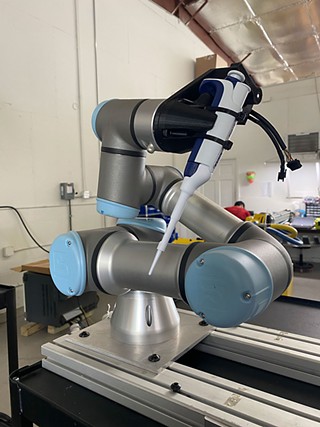Enlisting Robots in the Battle Against COVID
An Austin robotics company receives CARES Act funding to partially automate COVID-19 testing
By Nataleah Small, Fri., July 17, 2020
Robots vacuum our carpets, entertain our kids, and putter around grocery stores. But what have they done for us lately? Soon, robots may speed up the coronavirus testing process thanks to an innovative proposal from an Austin-based robotics company.
Nearly $600,000 in CARES Act funding was awarded to Wilder Systems and Advanced Robotics for Manufacturing (ARM) on July 6 to use robots to automate COVID-19 testing. The grant will pay for labor, materials, and robots. If everything goes according to plan, Wilder hopes to have a working prototype in the next three months, says Will Elliott, Wilder's director of business development.
Not to worry though; robots will not be sticking government-issued swabs up people's noses (not yet anyway). Wilder's robotic solution resembles more of a disembodied arm propped up on a lab bench than the Terminator in PPE.
One may ask, how will the team develop this technology in such a short period of time with limited funds? Designing robots, even disembodied ones, is not cheap or easy. The answer: Wilder will not be reinventing the wheel.
Eugene Kim, Wilder project engineer, says the team will program ready-made collaborative robots, designed to interact directly with humans in confined spaces, to conduct the most repetitive parts of COVID-19 testing. In a lab, the robot will work tirelessly from a mobile cart surrounded by vials of snot and testing equipment.
To those who have yet to fully experience a coronavirus test, the process includes probing a patient's nasal cavity with a cotton swab to gather a sample of mucus. Once collected and contained, tests are performed to isolate and amplify the virus' genetic material. Isolating and amplifying are multistep, tedious processes, says Kim.
Whereas technicians generally process samples one by one, robots can work through multiple samples simultaneously with impeccable timing. This frees up the technician's time for other work. The main benefits of automating the testing process include increased test turnaround time and decreased virus exposure to technicians, Elliott says. It is also easier to clean the robots on a regimented basis, whereas cleanliness of human operators is more "uncertain."
Currently, an individual lab can only complete 40-60 COVID-19 tests per day, says Erica Pocs, Wilder operations representative. By using robots, she says the team estimates labs will be able to process tests five times more quickly. Seem too good to be true? The next three months of R&D will serve as a litmus test for the feasibility of the project.
The team is aware challenges may arise during the testing process. For instance, technicians may complete specific tasks in a specific manner the robot finds difficult to replicate, says Elliott. Even robots have limitations.
"But that's what this [research and development] is to figure out," Elliott says. "We obviously believe that we can automate this process without any issue to the quality of the tests."
In three months, Advanced Robotics for Manufacturing will evaluate Wilder's progress and determine whether to move forward with development, says Cara Mazzarini, ARM technology portfolio manager. Founded in 2017, ARM is a national institute for manufacturing with 250 member organizations, Wilder being one of them. ARM manages funding for the Department of Defense with objectives related to advanced robotics for American manufacturing.
Once Wilder has a prototype, Mazzarini says ARM will assess whether the robot can process more tests than a human, how many errors it makes, and its ability to operate over a period of time.
If the prototype is less successful than anticipated, the results will be reported to the ARM consortium and NIST, says Mazzarini.
"It's the nature of this type of work that sometimes things work and sometimes they don't," Mazzarini says. "But we have every confidence that Wilder will be able to focus and drive to the results we're looking for, especially because the need is so great and so urgent."









